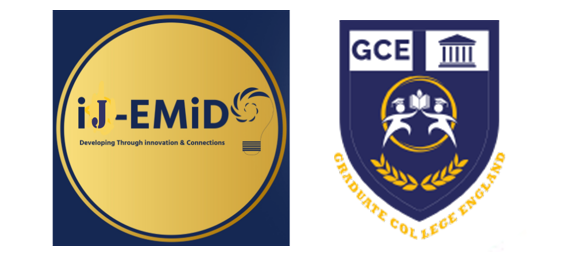A Solution to reduce re-offending through entrepreneurship-A case study of Punjab province of Pakistan
Muhammad Kamran
Abstract
This study explores the effect of entrepreneurship in remedying unemployment among ex-offenders in urban communities, using Punjab province, Pakistan as a case study. This paper focuses on ‘Prison Career Entrepreneurship’ PCE programme carried out inside the prisons in Punjab province of Pakistan. Based on semi-structured interviews with the participants, the author observed whether such programmes offer a truthful opportunity for reducing reoffending. Offenders are facing huge challenges from over- crowding, exclusion, violence extremism and health issues in prisons. Reducing re-offending among ex-offenders would help to diminish these problems .
Keywords: Entrepreneurship; start-up training; ex- prisoners; recidivism; prison; programmes; Unemployment.
Exploring the Different themes of Barriers And Challenges for Young Entrepreneurs In London in the United Kingdom
Daria Markova and Sumesh Dadwal
Abstract
This study explores the challenges and barriers faced by young entrepreneurs aged between 18 to 25 in London, United Kingdom. Primary data has been collected from young entrepreneurs from London that has shared their journeys. The final results indicated that the main challenges that young entrepreneurs face are related to knowledge, funding, and prejudice and they use numerous ways that one can overcome them. The results of this research can be used by both present and future entrepreneurs, as well as investors or the general public, to enhance their understanding of entrepreneurship.
Keywords: Entrepreneurs, Entrepreneurial Skills, Entrepreneurial Motivations, Start-ups, funding for SMEs.
The Nature of Truth in Research Through Lenses of Three Modes – Theory, Practice, and Mixture of both with Innovations
Benjamin Olusola Ajibade
Abstract
This piece of work explored the nature of truth in research by narrating the development of knowledge through Mode 1 and mode 2 knowledge, including the recent discussion around mode 3 system. The impact of this on researchers was emphasised by mode 1 (theory) knowledge and mode 2 (practice) knowledge filling the theory-practice gap. Mode 3 system knowledge aimed to encompass both mode 1 and 2 but included innovation as part of the knowledge development. The work discussed research paradigm in relation to ontology (reality of the things we know/truth) and epistemology (knowledge/the way we know things) including axiological assumptions (value) and same related to the of research methodological interest of individual researchers.
Keywords: Knowledge, System, Knowledge Gap, Innovation, Truth, Positivism, Interpretivism
Impact of Airbnb in a residential area- A Qualitative Study of Plaza de Joanic and Pable-sec in Barcelona
Shamso Miah and Vipin Nadda
Abstract
This study investigates the impact of Airbnb in residential areas by identifying the factors which have affected two residential areas of Barcelona. Based on a holistic approach of three stakeholders (tourists, Airbnb host and residents), the research study has evinced multiple perspectives of the impact of Airbnb, most notable was the positive contribution made by the sharing business and the negative effects of gentrification. The study has also found a correlation between tourist growth and residential sentiment which is in accordance with Doxey’s index. The mix semi-structured and non-directive interviews have also revealed the intrinsic relationship between Airbnb host and guest which plays a pivotal part of the sharing experience which is more personal as to a hotel. In conclusion, each stakeholder has different views and interpretations of Airbnb depending on their benefits and their involvement in the tourist system.
Keywords: Sharing economy, disruptive innovation, Airbnb, growth, qualitative, stakeholders, gentrification, and tourist system
International Parity Tests of Ecozone- Implications for Monetary Integration and Models of Exchange Rate Determination
Peter Kehinde Mogaji
Abstract
This paper appraised the simultaneous validity of international parity conditions (PPP, IFE, UIP and GPPP) for the proposed monetary cooperation within West Africa, and considered the implications of these for monetary integration and exchange rate determination through the investigation of directions of bilateral relationships between these ‘Ecozone’ countries. Data spanning averagely over a period of between 1990 and 2017 were employed. Residual-based cointegration test methods of Engle-Granger, Philip-Ouliaris and Park’s Added Variable and the Johansen cointegration tests were applied. Results generated by various empirical estimations generally revealed that the international parity theoretical propositions of absolute PPP, relative PPP, international Fisher Effects and the uncovered interest parity are hugely not valid across the proposed ‘Ecozone.
Keywords: International Parity Conditions, Purchasing Power Parity, International Fisher Effect, Uncovered Interest Rate Parity, WAMZ, WAEMU
Value Creation For Rural Women Through Social Business
Md Hussin Alam
Abstract
Value creation for rural women is deliberated as a great venture to generate social business as a tool of women empowerment. Social business has been a role model in women’s empowerment in Bangladesh, and the country is realizing an intelligible change in society because of its efforts in this regard. This study was conducted to verify how the past year and total working days of rural women were being used in the workplace. The study was tired to find the reasons behind the adult women job crisis; how the women have been affected by the job owner; and how social business can solve the women empowerment crisis. The participants of the study were 55 local worker women’s. The participants were selected randomly from seven different places in Bangladesh The study found that the participants were aware of their future careers they would have. The study will make rural women financial self-sustainable.
Keywords: Value creation, Adult women education, Grameen Bank, Social business, Women Empowerment

